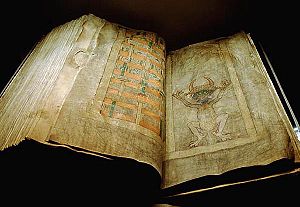Here is a great post I just read. Dr. Mariottini has sounded an alert about a new online translation of the Bible - The New Simplified Bible. The problem? The translator says he made an honest translation free from the influence of any church or sect but you have complete mistranslations of John 1:1 and John 1:18. These verses equate Jesus with God yet he translates them as saying Jesus is "god-like". I'm all for making easy to read translations of the Bible, but don't change what it says! I agree with Dr. Mariottini. I can't recommend this translation either. The translator is denying the deity of Christ and I know for a fact that the Greek is being mistranslated by him. It galls me that he has the audacity to say that he was not influenced by any church or sect.
Dr. Claude Mariottini - Professor of Old Testament: The New Simplified Bible.
Personal blog that will cover my personal interests. I write about Christian Theology and Apologetics, politics, culture, science, and literature.
Thursday, November 5, 2009
Dr. Claude Mariottini - Professor of Old Testament: The Character of the God of the Hebrew Bible
Dr. Mariottini has posted a post about a conference from back in September in which research was presented talking about the character of God as shown in the Hebrew Bible. This is important. I would contend that that the character of God has not changed and is ultimately revealed to us through Jesus. The Old Testament tells us much about character of our Creator. Anyone who see the existence of evil as a challenge to the truth of God's existence or wants to know more about who God is...should see this post. There are links to videos of the conference on his blog too. I may do a review of the material on my own blog but I'm not sure yet. Thanks, Dr. Mariottini.
Dr. Claude Mariottini - Professor of Old Testament: The Character of the God of the Hebrew Bible
Dr. Claude Mariottini - Professor of Old Testament: The Character of the God of the Hebrew Bible
Dr. Claude Mariottini - Professor of Old Testament: Hypatia: A Woman of Renown
Dr. Claude Mariottini posted a link to great article about a figure of ancient history that few people have heard of. Her name was Hypatia and she was a lecturer, a philosopher, an astronomer, and a mathematician in a time when women were not allowed in those fields. Truth be told, there are few women in those fields even today.
Below is a video showing the trailer for a movie based on her life. Dr. Mariottini is right, this artivle is really great on Hypatia.
Dr. Claude Mariottini - Professor of Old Testament: Hypatia: A Woman of Renown
Below is a video showing the trailer for a movie based on her life. Dr. Mariottini is right, this artivle is really great on Hypatia.
Dr. Claude Mariottini - Professor of Old Testament: Hypatia: A Woman of Renown
Arminius' Works - NINTH CHAPTER OF ROMANS
I've had a chance to examine a letter Arminius wrote to Gellius Snecanus about exegeting Romans 9. I admit that I'm impressed to how Arminus mind worked. He was much better at explaining Romans 9 then many people today. I found that I agreed with much of what he wrote in the letter. I see that I have greatly misjudged the man before reading his works. I think he nailed the main point of the chapter when he wrote:
I find myself in total agreement, as I'm sure all Christians would. The disagreement comes in interpreting what Paul is saying is the reason why some people are lost and some people believe. Paul discusses this point in the context of the fact that most Jews of his time (as well as now) reject Jesus as Messiah does not negate the fact that the Bible is true. It's at this point that I see Jacob Arminius takes the same tactic as some do today. Instead of seeing the examples given in the dynamics of Isaac vs Ishmael and Jacob vs Esau as being applicable to individuals, they are taken as types.
Arminius' Works - NINTH CHAPTER OF ROMANS
I come to the subject itself. In the first place, the scope of the chapter is the same with that of the whole epistle: That the Gospel, not the law, is the power of God unto salvation, not to him that worketh, but to him that believeth, since, in the Gospel the righteousness of God is manifested in the obtainment of salvation by faith in Christ. This chapter performs its part, and indeed is peculiarly engaged in the support of that proposition. It defends the proposition against the objections of the Jews, who, with all their power endeavour to overturn it as hostile and destructive to their own views, and so defends it as to confirm its truth more and more, and, by refuting those objections, adds strength and stability to the foundation already laid, in that very divine word and purpose, which the Jews were strenuously wresting, in their own favour, to the overthrow of Paul's doctrine.
I find myself in total agreement, as I'm sure all Christians would. The disagreement comes in interpreting what Paul is saying is the reason why some people are lost and some people believe. Paul discusses this point in the context of the fact that most Jews of his time (as well as now) reject Jesus as Messiah does not negate the fact that the Bible is true. It's at this point that I see Jacob Arminius takes the same tactic as some do today. Instead of seeing the examples given in the dynamics of Isaac vs Ishmael and Jacob vs Esau as being applicable to individuals, they are taken as types.
Here we must repeat what was said before, as a general remark, that Esau and Jacob are to be considered, not in themselves, but as types, and so that which is attributed to them, is to be accommodated to the antitypes, or rather to the things signified. Hence, also, the antitypes are to be considered, before a conclusion, similar to the former, can be deduced from them, to the refutation of the sentiment of the Jews and to the confirmation of that of the apostle. But what those antitypes are, may be gathered from the end or design which the apostle has added, in these words: "that the purpose of God, according to election, might stand, not of works, but of Him that calleth." That is, God, in those words, "the elder shall serve the younger," addressed to Rebecca, "the children being not yet born, neither having done any good or evil," designed to indicate nothing else than that He had formed, in His own mind, from eternity, a purpose to communicate righteousness and salvation, not one which should embrace all the posterity of Abraham universally, but which should be according to election, by which He would distinguish between these and those, not considered simply in their own nature, as pure or corrupt, but in respect to the condition, by which righteousness and salvation were to be applied, as the apostle shows in the following words -- that this purpose, according to election, might stand not of works, but of him who calleth, in which words is contained a description of the antitypes, which had before been given in the phrases "children of the flesh" and "children of the promise." Here it is more clear, for the children of the flesh and those of the promise are, such, by their own peculiarity, defined by the apostle, in this passage, since the former are "of works," the latter of faith, by which obedience is rendered unto God, who "calleth." Therefore, the apostle says that the purpose of God, which is according to election, has reference to those who have faith in God who calleth, and who trust in Christ, not to those who seek salvation by the works of the law. The conclusion can be drawn from these things against the objection of the Jews in favour of the doctrine of the apostle concerning justification by faith, in this way: "If the word of God and His purpose is according to election, by which the former is rejected, and the latter accepted, then it follows, even if some of the Jews are rejected, yet that word and purpose is not in vain; rather indeed, if that purpose, which is according to election, should be said to embrace all without any election, it would be in vain; -- But this word and purpose is according to election; Therefore, even if some of the Jews should be rejected, yet that word and purpose does not, on that account, fail; it is, indeed, rather confirmed from that fact, because it is its nature to exclude some, as it is according to election, by which one is rejected and another accepted."Romans 9 in its entirety makes the case that God chose Isaac over Ishmael and Jacob over Esau. Why? Not because of anything in them but because of God's sovereign choice. The point of Arminus letter seems to be on the fact that we are saved by faith not of works or who our biological father is - and I completely agree. I will need to spend more time in this library cache online to see if I can find how Arminius answers the question of why those who believe believe and those who don't believe don't believe.
Arminius' Works - NINTH CHAPTER OF ROMANS
Subscribe to:
Posts (Atom)

![Reblog this post [with Zemanta]](http://img.zemanta.com/reblog_e.png?x-id=0c1bb246-194a-43cf-9819-706016be7991)



![Reblog this post [with Zemanta]](http://img.zemanta.com/reblog_e.png?x-id=39e52ca1-47e7-4a04-ac17-c0865f982f84)

![Reblog this post [with Zemanta]](http://img.zemanta.com/reblog_e.png?x-id=1b1c6737-f8cc-41ec-835d-c711eccc731d)